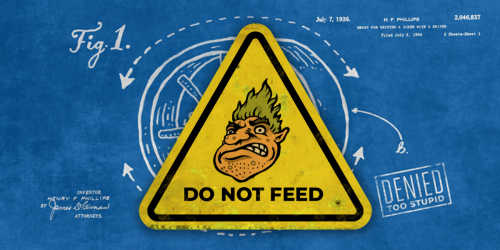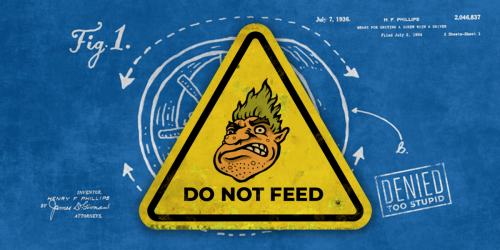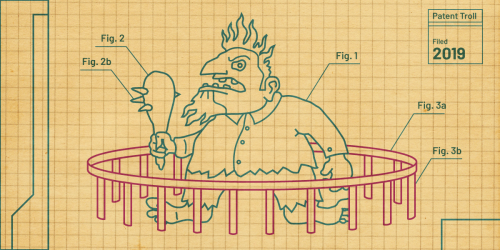This is the year for patent reform. Let’s put an end to forum shopping.
There’s a bill on the U.S. Senate floor that would make it more difficult for patent trolls to pressure innovators with unfair infringement lawsuits. But there’s a key provision missing. Without that provision, we think that the bill’s reforms would not be as effective as they could be.
The PATENT Act (Protecting American Talent and Entrepreneurship Act) would take some big steps to fix patent litigation. It would require patent owners to provide more in-depth information about the alleged infringement at the time when they file suit (it’s a common patent troll tactic to waste defendants’ time and money with unclear allegations). It would make it more difficult for trolls to target end users. When the court rules against a troll, it would allow the court to more easily require the troll to pay the defendants’ legal fees. We’ve written about the PATENT Act before, and we think it’s a promising development.
What’s missing? Venue reform.
Why does venue matter?
Under current law, a patent owner can usually file suit in any district in which the defendant does business. The federal circuit has ruled that for the purposes of determining where a patent case is heard, a business is considered active in any state in which its products or services are available. For many patent defendants, that means that a troll can sue them for infringement in any district in the U.S., regardless of where they’re based or conduct the bulk of their business.
To understand why that’s a problem, look no further than the Eastern District of Texas. In the past 16 years, the Eastern District has become increasingly attractive to patent trolls as a venue for patent infringement suits. In the first half of 2015, nearly half of the nation’s patent lawsuits were filed there.
Earlier this year, we reported that some Eastern District of Texas judges had instituted rules that seemingly contradict federal procedural law. For example, the federal rules allow a defendant to file a “motion for summary judgment,” arguing that the plaintiff cannot win given the undisputed facts of the case. This process is meant to be quicker and more efficient than trial and can discourage patent owners from filing blatantly absurd infringement suits.
But some judges in the Eastern District require defendants to ask for permission to file a motion for summary judgment, with no assurance that the court will give that permission. As for defendants that are granted permission to file a motion for summary judgment, those motions are successful only 18% of the time (the national average is 31%).
Another way the Eastern District favors patent owners is with discovery rules. Discovery is the process whereby litigants request information and documents from each other that will be relevant to the case. Discovery is often very expensive for defendants in patent infringement cases; it’s one of several factors that can make patent litigation much more costly for the defendant than for the plaintiff.
It’s particularly problematic in the Eastern District, where judges require parties to turn over a lot of information without being asked and to do so very early on in the litigation. That increases costs on defendants (who are usually the ones with lots of documents, especially when the patent owner is a non-practicing entity) and helps patent owners push for a settlement.
The upshot is clear: if you’re a patent troll, file your infringement suits in the Eastern District of Texas. They’ll be expensive for defendants, and that expense will give you ample leverage to pressure for a settlement. If they do go to a trial, you’ll have an elevated chance of winning.
Venue reform strengthens other patent reform measures
We think it’s crucial that a comprehensive patent reform package includes venue reform. In fact, its absence in the PATENT Act arguably weakens other provisions in the bill.
As we mentioned above, one of the key changes the bill would make is allowing courts to force plaintiffs to pay defendants’ legal costs for unreasonable infringement suits (fee shifting). But it’s important to keep in mind that judges will have considerable discretion when deciding whether to award fees.
Given the Eastern District of Texas’ track record, it may be less likely to grant defendants’ motions for attorney fees than other districts. The district appears to have denied all motions for fees in recent months, though the data set is very small. Since fee shifting is largely within the judge’s discretion, it will give plaintiffs even more incentive to sue in the most plaintiff-friendly jurisdictions.
It’s not about Texas
It would be a mistake to think that venue reform is just about Texas. It’s not. If the Eastern District changed its rules, other districts might take its place. And therein lies the real problem: as long as plaintiffs can file patent lawsuits anywhere, defendants’ rights will only be as strong as the weakest link.
Allowing plaintiffs to sue in any district unavoidably creates a market for forum selling. In that market, the plaintiff has all of the buying power. Any rule changes, biases, or precedents that benefit the plaintiff (or even appear to benefit the plaintiff) will be rewarded; any that don’t will be punished. As Daniel Klerman and Greg Reilly put it, “When plaintiffs have wide choice of forum, such judges have incentives to make the law more pro-plaintiff, because plaintiffs choose the court with the most pro-plaintiff law and procedures.”
Even if no court went out of its way to favor patent owners, their ability to shop for a forum would still be inherently advantageous. It’s unavoidable that patterns emerge among courts, both in their procedures and in their rulings. Predictable patterns in judges' perspectives aren’t necessarily a bad thing, but forum shopping lets plaintiffs exploit them.
It’s not too late
The Innovation Act is currently on the floor in the U.S. House of Representatives. EFF endorses both bills, while recognizing that each one has its strengths and weaknesses, but one thing that the Innovation Act gets right is venue reform.
Under the Innovation Act, venue for patent litigation would be limited to districts where it makes sense; for example, where the defendant’s principle place of business is, or where the patent owner has a working, manufacturing facility. We believe that that simple provision is an essential bedrock that will significantly strengthen the final patent reform package.
This is the year for patent reform. If you care about innovators’ rights, contact your representative, contact your senators, and let them know that patent reform is important to you. Tell them it’s crucial that venue reform makes it into the final bill.








